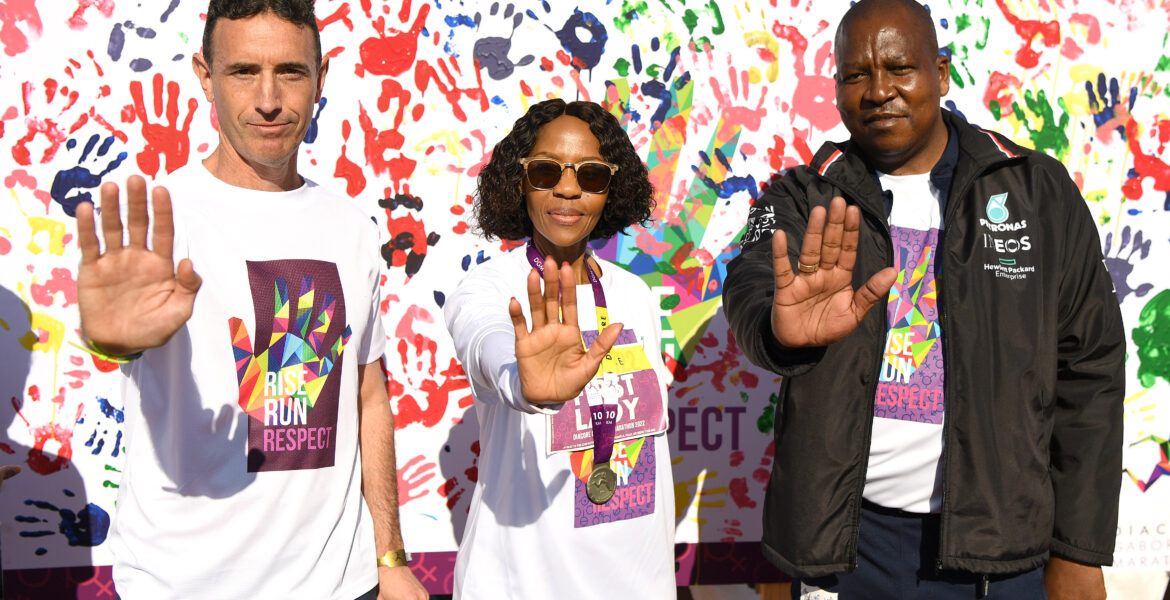- In 2021, BGBVC alone provided 1 654 survivors of GBV with counseling services
- Botswana continues to record high incidents of GBV
GOSEGO MOTSUMI
After a two-year hiatus due to the COVID-19 pandemic, this year’s edition of the Diacore Gaborone Marathon (DGM) returned with a theme based on Gender Based Violence (GBV) as the current prevalent socio economic issue. To that end, the organisation donated proceeds of the marathon towards charities and developments around the country, with a significant contribution going towards the fight against GBV through partnership with the Botswana Gender Based Violence Prevention and Support Centre (BGBVC).
“We made quite the comeback, with us raising over P1.8 million solely for charity and developments and donating P300 000 specifically for GBV,” Diacore Program Director, Kabelo Poloko said in an interview.
“The proceeds will be used to support activities aimed at raising awareness on services provided by BGBVC, promote the emergency line and branding at various BGBVC sites. Part of the funds will also enable BGBVC to provide training counsellors and shelter on emotional intelligence and customer service to improve quality of services.”
COVID-19 worsened GBV
While GBV is a global pandemic that affects one in three women in their lifetime, the pandemic has certainly been a factor in the prevalence of GBV cases. Diacore’s desire is sensitize the public as there still remains a need for educating people about GBV in the country. Like many other African countries, Botswana continues to record high incidents of GBV. According to the 2012 Botswana GBV Indicators Study, over two thirds of women (67 per cent) reported to having experienced some form of gender-based violence in their lifetime.
The 2017 National Relationship Study reported that one in three women (37 per cent) and one in five men (21 per cent) reported experiencing some form of GBV at least once in their lifetime. The most common form of GBV experienced is emotional intimate partner violence at 31 per cent for women and seven per cent for men. Furthermore, other forms of violence continue to be documented or reported which include non-partner sexual violence, child sexual abuse, sexual harassment, and child trafficking.
Said Poloko: “The current statistics may be higher than what is reported on these official studies. In 2021, BGBVC alone provided 1654 survivors of GBV with counseling services. The majority of these clients were women. Out of a total of 1 654 survivors provided counseling; 1 444 reported emotional abuse, 131 reported to have experienced physical abuse, 66 clients reported to have experienced sexual violence and 13 reported economic abuse.”
Sensitising communities
Poloko said there is need to engage with communities to address harmful practices and behaviors that fuel GBV as it is of urgent matter that the tolerance for and the normalisation of GBV must be displaced in the society. There is also a need to avail sufficient and effective psychosocial support programmes for all people experiencing and those affected by GBV.
He added. “We need to strengthen the justice system to include law enforcement agencies, to ensure that incidents of GBV receive the highest priority and relevant care is provided to survivors. Ensure that Academia plays a pivotal role in ending GBV by providing data-driven research outputs that advice policy and interventions from a prevention and response perspective.”

